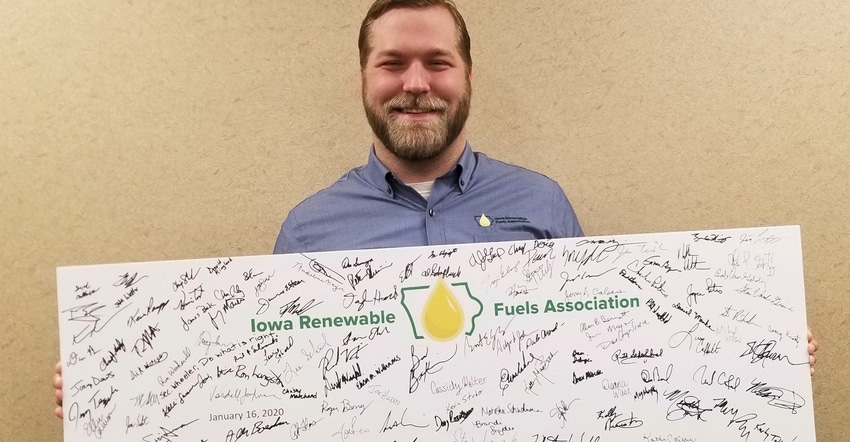February 10, 2020

People who attended the recent 2020 Iowa Renewable Fuels Summit have a message for EPA Administrator Andrew Wheeler: Follow the U.S. Department of Energy recommendations for small-refinery exemptions and uphold the Renewable Fuel Standard’s volume requirements.
The exemptions issued by EPA to the RFS requirements for petroleum refiners to blend a certain amount of ethanol and biodiesel into gasoline and diesel fuel each year have hurt biofuel producers. Plants reduced production and some shut down in 2019. In Iowa, ethanol production dropped for the year for the first time ever. And adding insult to injury, EPA’s final rule regarding the 2020 volume requirements of the RFS was not what had been promised by the Trump administration. EPA, in granting exemptions, has favored the oil industry and hurt biofuels.
The Iowa Renewable Fuels Association (IRFA) sent a letter in late January to Wheeler, signed by attendees at the Iowa Renewable Fuels Summit, urging EPA to begin restoring integrity to the RFS blend levels. The letter, in part, reads: “In order to uphold President Trump’s promise to ensure RFS levels will not be undermined, the EPA must follow through on its commitment to abide by Department of Energy recommendations for SREs. Doing so in the months ahead will be the first step to ensure 15 billion gallons means 15 billion gallons. …”
Opportunity for EPA to rebuild trust
The letter also emphasized the importance of EPA following through on the commitment to adhere to DOE recommendations as a way to restore trust in EPA, concluding: “It’s time for you to rebuild rural America’s trust in EPA’s handling of the RFS. We urge you to start that process now.”
The full text of the letter is below. A copy of the letter, and a photo of the signed poster was sent to Wheeler’s office.
January 16, 2020
Dear Administrator Wheeler:
While we’re disappointed in how EPA’s 2020 RFS rule addressed small refinery exemptions (SREs), the rules going forward are now set. In order to uphold President Trump’s promise to ensure RFS levels will not be undermined, the EPA must follow through on its commitment to abide by Department of Energy recommendations for SREs. Doing so in the months ahead will be the first step to ensure 15 billion gallons means 15 billion gallons, while also helping to boost the struggling agriculture economy. It’s time for you to rebuild rural America’s trust in EPA’s handling of the RFS. We urge you to start that process now.”
Ready and willing to work with EPA
At the Iowa Renewable Fuels Summit, Monte Shaw, IRFA executive director gave a speech on the state of the Iowa biofuels industry. He characterized the industry as frustrated but focused on moving forward, working cooperatively with EPA in 2020.
“Yes, the biofuels and ag community were frustrated on Dec. 19, but that frustration has slowly evolved into focus on the work to be done in 2020,” Shaw said. “That starts by trying to rebuild some type of working relationship with the EPA. Speaking for myself, I’m ready to try. I want to try to work with EPA to take steps, small and large, that can rebuild some trust. The question is: does EPA want to do that?”
The EPA rule finalized on Dec. 19, 2019, ignited frustration throughout the ag and biofuels community. Instead of accounting for demand destruction caused by small-refinery exemptions in future RFS rulings by using an average of the number of previously granted SREs, providing market certainty, the rule stated EPA will account for SREs using an average of U.S. Department of Energy recommendations, leaving the integrity of the RFS up to EPA’s discretion.
Need to move forward from 2019
Shaw emphasized that despite this disappointment, there were many other policy victories in 2019 that the biofuels industry can use to grow years into the future.
“My view of 2019 is no longer solely colored by the frustration of December 19,” he said. “While it is certainly a headline, it is not the entire story. As I consider 2019 from a policy perspective, there were many more significant victories than defeats. And while admittedly not a quick fix to our current economic challenges, I enter 2020 with the feeling that future economic gains will be one day traced back to 2019.”
Shaw cited year-round E15, a five-year extension of the biodiesel tax credit, and progress in various trade markets among his list of 2019 victories. He also emphasized that while the rule EPA issued on Dec. 19 didn’t create the immediate market certainty the industry fought for — it did create a path forward.
“If the Trump administration follows through, then 2020 will be the first year where the RFS was fully implemented at the statutory levels since 2013,” Shaw said. “It’s hard to believe, but every year from 2014 to 2019, the congressionally-mandated RFS levels of ethanol and biodiesel production have been undermined by either illegal general waivers under the Obama Administration or abuse of refinery exemptions under the Trump Administration. There has not yet been a year when the 15 billion-gallon RFS was truly implemented at 15 billion gallons.”
Priorities to focus on in 2020
Shaw concluded by outlining top priorities for 2020 for the biofuel industry to stay focused on, including encouraging EPA to follow through on their promise to follow DOE recommendations and make the RFS whole, addressing a court-ordered remand of 500 million illegally waived gallons of ethanol from the RFS, and pushing for new trade opportunities with Mexico and China.
“2019 was not a fun year,” Shaw concluded. “But policy seeds were planted that could grow into meaningful opportunities for biofuels producers and farmers in 2020. The task before us is to work with the Trump administration to make this happen. I am ready and willing if they are. 2020 can return hope and financial stability to rural America. We stand here today urging the Trump administration to take the steps necessary to harvest the possibilities.”
The IRFA represents the state’s liquid renewable fuels industry and works to foster its growth. Iowa is the nation’s leader in renewable fuels production with 43 ethanol refineries capable of producing over 4.5 billion gallons annually (including 34 million gallons of annual cellulosic ethanol production capacity) and 11 biodiesel facilities with capacity to produce nearly 400 million gallons annually.
About the Author(s)
You May Also Like






